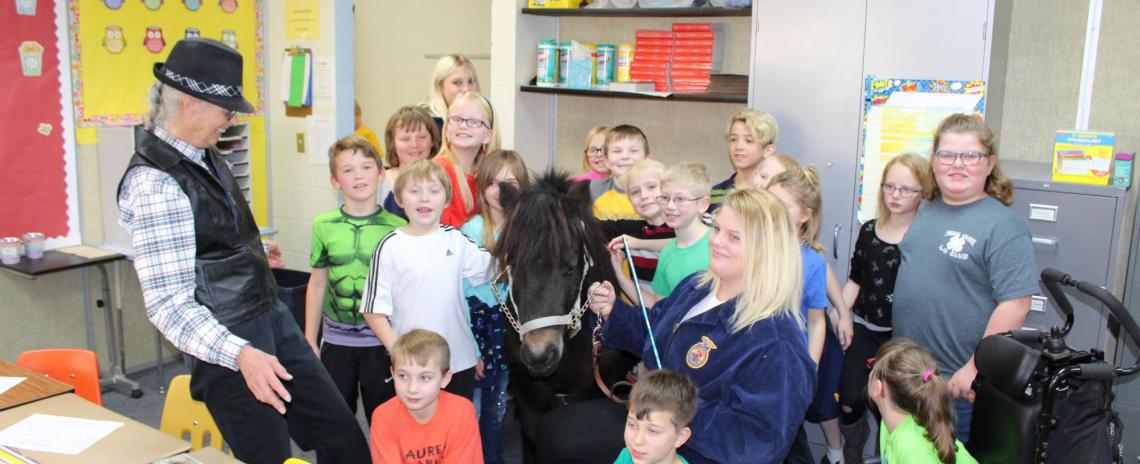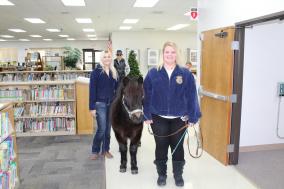A Friend to All: Pippen the therapy pony uplifts those in L-C-C schools, community
A Friend to All: Pippen the therapy pony uplifts those in L-C-C schools, community
By Tyler Dahlgren
NCSA Communication Specialist
The click-clack of hooves on the tile floor of Laurel-Concord-Coleridge’s library should have, in theory anyways, been a foreign sound.
There should have been looks of confusion and noses scrunched up in puzzlement, because this certainly wasn’t something you see on an average school day.
And yet as Pippin, a four-year-old Shetland pony, made his way through the elementary wing of the school, he left behind a trail of nothing but smiles. On the faces of students and teachers alike.
Pippin, a therapy pony, has that effect on people, and nobody knows it better than his two handlers, junior Stephanie Aschoff and sophomore Reanna Lawyer.
“We will be out walking around with him and people drive by and just smile,” Lawyer said. “Just seeing him gives them the biggest smile and that’s why doing this makes us so happy.”
At L-C-C Schools, it’s called the “Pippin Expedition”, and it’s a unique, and mutually beneficial method of extended education that began on the first day of school in mid-August, when Pippin showed up in trailer and met his two new friends, both members of FFA at the school.
It took about three days for the bond to be built. In horse years, Pippin is somewhere around 13-15, and the girls say he acts accordingly.
“He is a teenager, so he’s ornery,” Aschoff said. “And he likes to eat. He will fight with you on a lot of stuff. He doesn’t like to put his halter on. He’s very precise in what he likes to do.”
Pippin was a star from day one.
“The first day we walked him out and the newspaper was already there,” Lawyer said. “People usually say ‘Hey, you’re the girls that walk that horse around. This is a good thing that you’re doing’.”
Provided by Personal Ponies, Pippin was part of a school vision that includes an extension of education beyond the classroom.
He visits Hillcrest Care Center and mingles with the community. He brightens days. And though he currently spends every other week in Laurel as the therapy pony certification process progresses, he has found a home in Cedar County.
“He’s not at the school as a one-time thing,” Lawyer said. “If a student needs help, then Pippin can come in and help. He’s always there.”
And soon, Pippin will permanently be in Laurel. That’s the plan, anyways.
“He would be here all of the time if we could find a place where he could live on the ground,” FFA Supervisor Dr. Irene Graves said of Pippin, who is supported by the community and sleeps in a sale barn. “We are trying to line the floor of his stall with rubber so he’s not on the concrete all the time. We also have permission to use the livestock auction ring, so when it’s cold out the girls still have a place to work with him.”
Pippin stepped out of his trailer mid-morning Tuesday, walked some stairs and even tried opening the door to the school by pressing his nose against the handicap button. Then it was off to two third-grade classrooms.
Eyes widened and mouths dropped when Aschoff and Lawyer led Pippin into the rooms. Students lined up to pet Pippin, who happily accepted the attention and affection. A group hug followed.
In between, the girls answered questions about their friend.
What kind of food does he like? Pippin loves his apples and peppers.
How old will he get? Shetlands live into their 30s.
Would he be friends with a pair of miniature donkeys? Surely.
A year ago, Lawyer couldn’t have envisioned herself in such a scenario, confidently standing in front of a classroom. Before, she was admittedly shy. Now she’s more outgoing, and she has her new friend to thank for that.
“Without Pippin, I probably wouldn’t have even said ‘Hi’ when I walked past that schoolroom,” Lawyer said. “Not that I don’t like kids, it’s just that I used to be really shy. Since Pippin, I’ve gotten used to talking more, and I’m more outgoing.”
Graves, who has spent her life around horses, sees that growth in her students, too.
“Look at these rosy-cheek, aggressive, confident girls!” Graves says with a palpable sense of pride.
Before, the girls weren’t overly active in the school. A stubborn, intelligent and playful Shetland pony changed that.
“Their ability to communicate and their willingness to be outgoing,” Graves said before trailing off. “Pippin really grabbed them by the tails and pulled them in.”
Pippin’s journey to northern Nebraska, in a way, started many years ago, when Dr. Graves would bring her horses along to pick her son up from school. The other kids would rush to the window to get a look, and pretty soon the only one left in the room was the teacher.
“One afternoon, I went to give (the teacher) a ride and she had her son with her, who has mild to moderate Down syndrome,” Graves, who grew up in Meadville, NE, before teaching in South Dakota and North Dakota, said. “We got him into Special Olympics, where he would ride my 28-year-old pony.”
That pony’s age was announced over the loud speaker, and soon after Graves received a call from Personal Ponies, who had a pony for the boy. Now she’s on her fourth set.
“I get them as little guys, and if and when the right situation comes up, where he needs to go to a certain individual, then he will move on and we start all over,” Graves, who has been at L-C-C for almost a year, said.
L-C-C Principal Jay Vance and Graves coordinated the expedition by following the school’s mission statement and vision. How do you keep that spark going? That was the question they asked themselves when searching for extended educational opportunities.
“This is something that could very well spark a career, possibly in equine therapy or something similar,” Vance said. “This is a learning curve like no other, and the girls have blossomed and done very well. I couldn’t be more proud of them.”
Everyone that crosses paths with Pippin gains a friend.
On a recent visit to the care center, Pippin spent time in the room of a man that had been around horses his entire life, making his day.
Pippin knew where he needed to be. Later that night, the man passed away.
“When he is voluntarily going to the people, that’s my favorite thing about Pippin,” Aschoff said. “I don’t have to choose who he goes to, because he knows what he wants and who needs him.”
And what Pippin wants, always, is to help.



